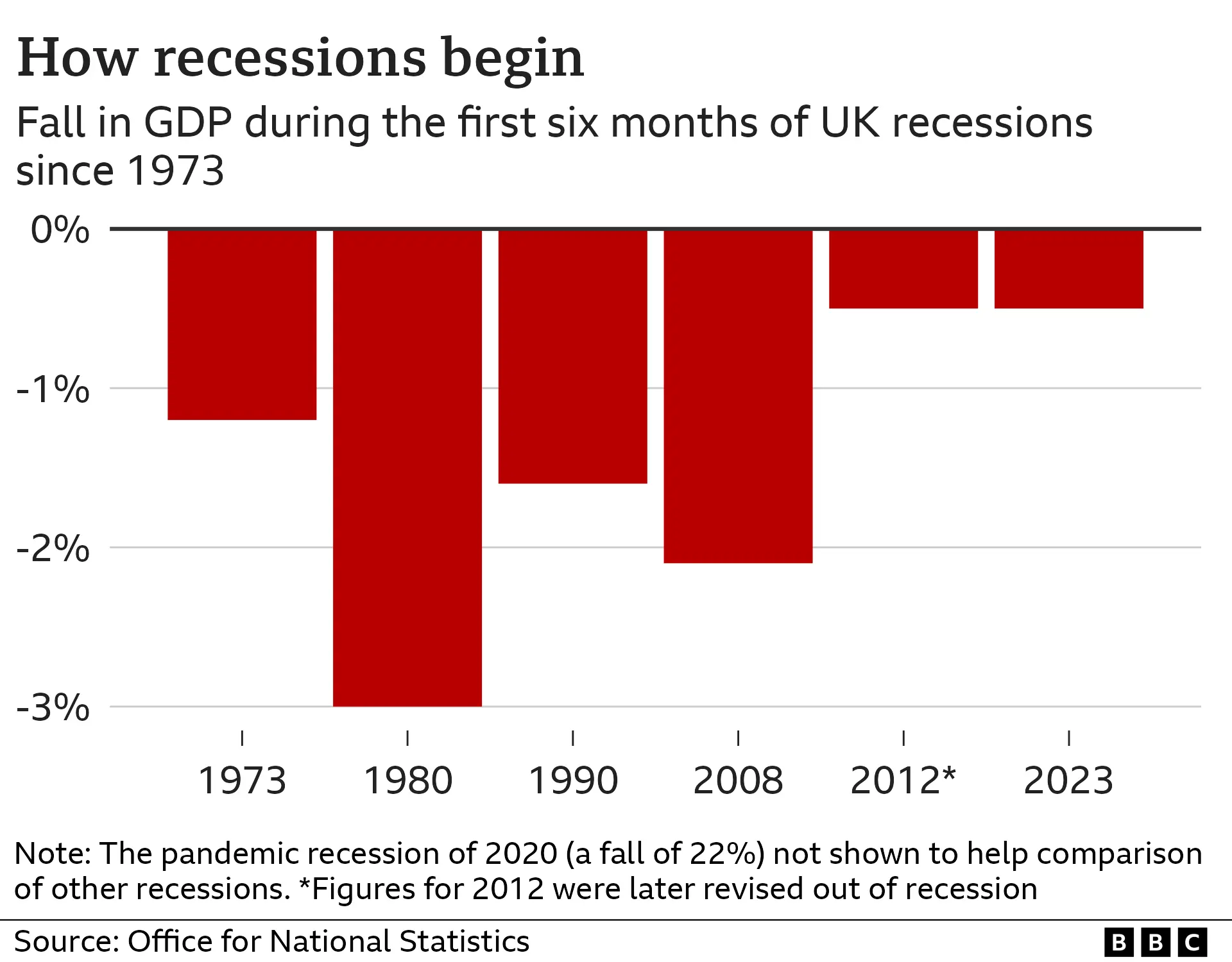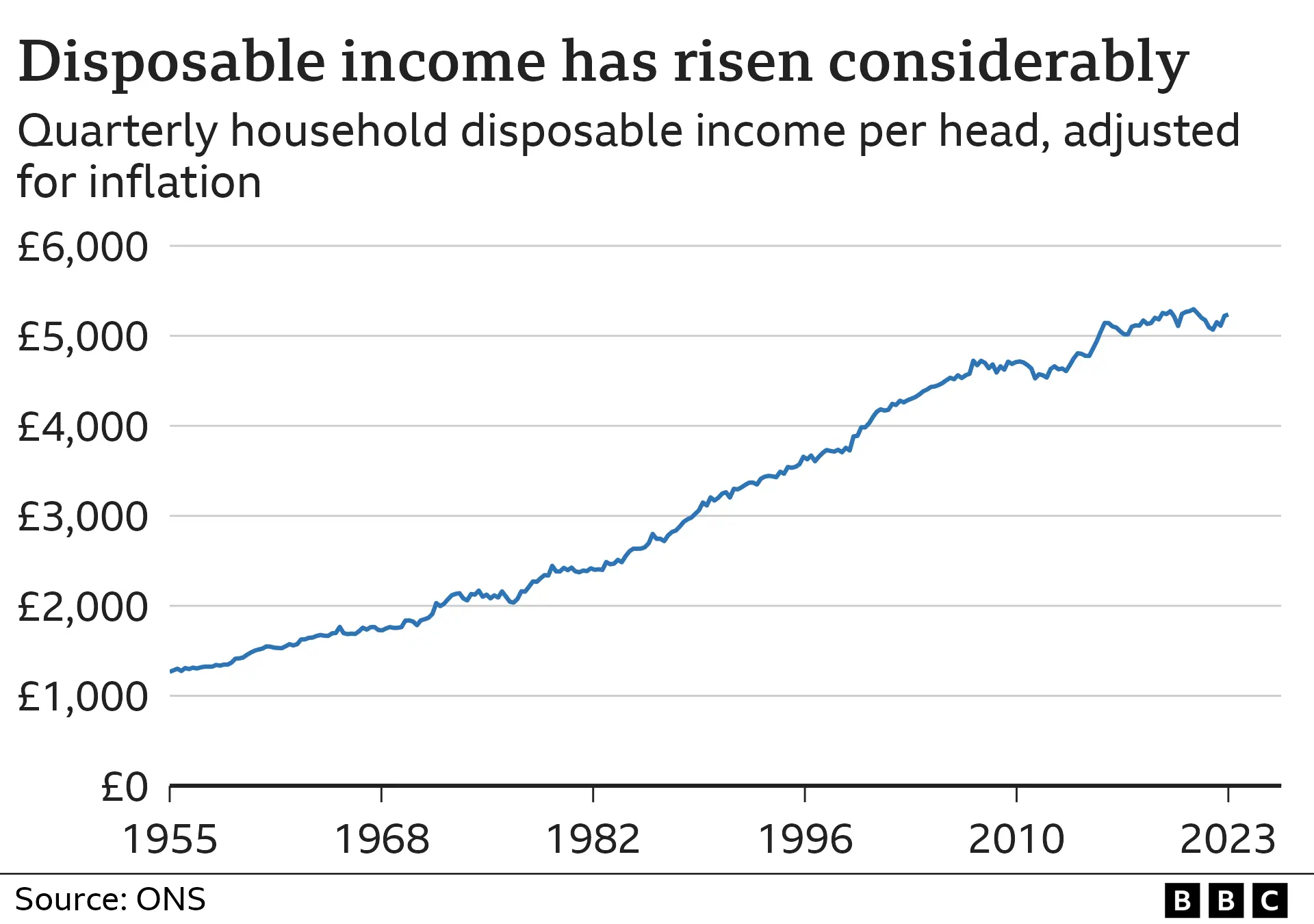Rachel Reeves: Is this the worst economic inheritance since WW2?
Shadow chancellor Rachel Reeves claims that whichever party wins the election, it will inherit the worst set of economic circumstances since World War Two.
There are certainly problems facing the next government, but other governments in the last 80 years have also faced big economic challenges.
Margaret Thatcher came to power in 1979 at the time of an oil crisis and rapidly-rising prices and the coalition government of 2010 followed a global financial crisis.
Ms Reeves told the BBC that the current situation was "a dire inheritance" as she laid out the measures she was basing her claim upon.
We have had a look at the evidence for each of them.
Debt
Ms Reeves said: "If you look at debt as a share of our economy that's the highest since 1951."
Actually, the Office for National Statistics, which compiles the figures, says: "Net debt as a percentage of Gross Domestic Product (GDP) is currently at levels last seen in the early 1960s."
Ethan Ilzetzki, from the London School of Economics, described the current level of debt as being "high but nowhere close to where it was in the 1950s".
And on the overall claim about the worst conditions since World War Two, he said: "I struggle to find a metric that would make that statement correct".
The independent Institute for Fiscal Studies think tank said: "The next government is likely to face some of the most difficult economic and fiscal choices the UK has faced outside of pandemics, conflicts and financial crises."
Taxation
The shadow chancellor said: "The tax burden is the highest for 70 years."
The tax level, measured by how much of the country's economic output (measured by GDP) is raised in tax revenues, is estimated to be just above 36% this year.
This is high historically. It has only been higher last year and in the first two years on record, 1948 and 1949, a time when the UK was recovering from the war and the NHS was founded.
Taxation is projected to rise to 37.1% in the next five years which would be the highest level on record.
Growth
When asked about her claim, Ms Reeves pointed out: "The economy is currently in recession."
GDP has been relatively flat over the past two years and the UK went into recession because the economy shrank in the last two quarters of 2023.
But there have been deeper and longer ones since World War 2, including recessions during the mid-70s, early-80s and the 2008 Financial Crisis that resulted in shrinkages in the economy for two years in a row.

While it is rare for a country to be in recession during the run-up to an election, if that happens it would not be the first time.
Both the 2010 and the 1992 elections, for example, happened right after years when the UK was in recession.
Stephen Millard, from the National Institute for Economic and Social Research think tank, pointed to the recession at the time of the February 1974 election in which the economy contracted 3.7% while inflation was over 10%.
"These numbers suggest to me that the incoming Labour government in 1974 inherited an economy in worse shape than currently," he said.
Living Standards
"This will be the first Parliament on record where living standards have gone backwards not forwards," the shadow chancellor said.
The change to living standards is best reflected in households' real disposable income (RHDI) per person, which fell by 2.2% in 2022-23 - the biggest drop since records began in 1955.
Ms Reeves and the Resolution Foundation, a think tank focusing on people on lower incomes, pointed out that it will also be the first time on record that households will be poorer on this measure at the end of a parliament, than they were at its start.
The measure is projected to rise by 0.8% in 2023-24.
Nevertheless, living standards are obviously considerably better than they were in the 1940s, with current households' disposable income more than four times higher than after World War Two.

Other indicators
There are other indicators that the shadow chancellor could have looked at that show a different picture.
Inflation is at 3.4%, which is well above the 2% target, but much lower than some previous governments have had to deal with.
The rate of unemployment is at a relatively low level although there is concern about the number of people who have withdrawn from the labour market.
And the volume of retail sales is below pre-pandemic levels but is still higher than it was at any point prior to 2018.


